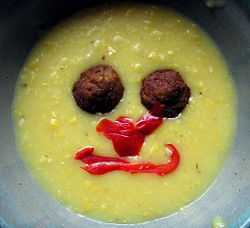Főzelék
| Főzelék | |
|---|---|
| Stew | |
 Fasírt (meatballs) and red pepper make a smiley face in a bowl of főzelék | |
| Place of origin: | |
| Hungary | |
| Recipes at Wikibooks: | |
|
| |
| Media at Wikimedia Commons: | |
|
|
Főzelék is a type of thick Hungarian vegetable stew. Főzelék is a special category in Hungarian cuisine, not quite like a soup, and thinner than a stew.[1] It is simply cooked, typically by simmering, not mashed. It is usually not cooked with meat, but bacon and spicy sausage may be added for flavor. Főzelék is often eaten as the main course for lunch or like a garnish for different meat courses. Főzelék is typically a home-made food, and being considered as an ordinary type of meal, it seldom (or never) appears on restaurant menu cards, apart from that of cheap diners.
Etymology
Its name roots in the verb főz ("cook"), modified by the -(a/e)lék suffix which renders the meaning to the results of the verb. Thus the word főzelék approximately means "[something] created by cooking". Hence in Hungarian a prefix is always used to make clear what the given főzelék is actually made of, e.g.: tökfőzelék (made of squash), babfőzelék (made of beans) etc.
Preparation
Főzelék can be made with a variety of ingredients including cabbage, bell pepper, potatoes, sauerkraut, tomatoes, peas, carrots, kale, kohlrabi, lentils, kidney beans, squash, mushroom, spinach, sorrel, green beans or mixed vegetables.[2]
It is usually thickened with roux and/or sour cream, and some combination of the following may be added: chopped onions, paprika, bay leaf, black peppercorn, dill, caraway seeds, garlic, lemon juice, parsley or vinegar.[3] If eaten alone it is often topped with pörkölt, fried eggs, smoked sausage, Hungarian meatballs flavoured with garlic, called fasírt, and other deep-fried foods.
References
- ↑ Emperor's Crumbs, The culinary crossroads of Central Europe, http://www.emperorscrumbs.com/2010/06/21/buttered-lentils-lencse-fozelek/
- ↑ June Meyers Authentic Hungarian Heirloon Recipes Cookbook
- ↑ Gundel's Hungarian Cookbook, Karoly Gundel.